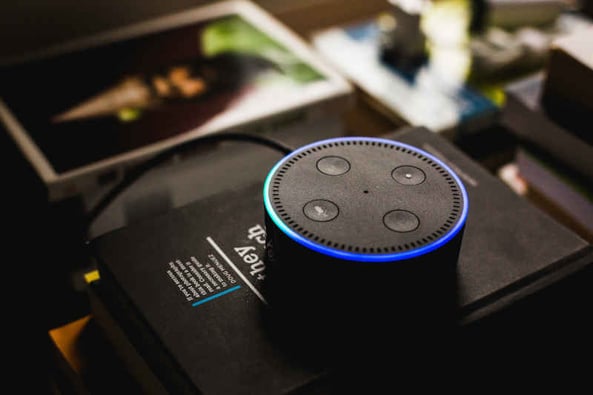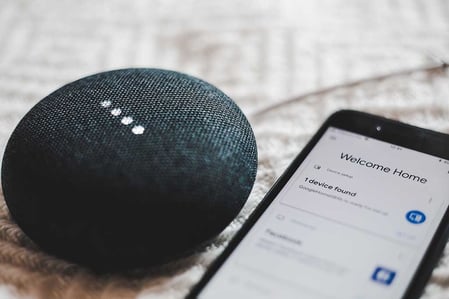Digital marketing is changing. What will happen to HubSpot?
- Home
- Digital marketing is changing. What will happen to HubSpot?
This article is a summary of the presentation talk by Christian Kinnear, Managing Director EMEA at HubSpot, at the London HubSpot User Group meeting (London HUG) on the 12th of December 2017. The full transcript of the presentation can be found by following this link.
The world of digital marketing and sales is changing, or maybe it has already changed. A lot of things are happening in the industry, and are happening more generally, and this also affects HubSpot strategy, of its products and of its relationship with customers. The intent of Christian Kinnear with this presentation talk is to explain these changes, connecting the main points to the thought of HubSpot.

A new way to interact
With the improvement of technology, the way we interact with it has changed. Now there are more voice interactive devices and technologies in the market, with mobile to lead the group: Siri, Cortana, Echo, Google Home, are some examples. So, they are already here and what HubSpot is doing is trying to look ahead and see what the next change is going to be, to understand what effect this could have on the market and on the consumer world.
There’s a new reality. People now want THE answer, they don’t want to go on their PC, search some keywords on Google and see where and what their response is. They don’t want options or lists, but only one answer back from their devices, only that one. The same logic can be applied on websites, with a futuristic vision of a website assistant ready to help you for everything you need from it.
With these new search trends even Google had to make changes in background, since 2013, and still the truly standard that everyone follows in terms of search and content. With its new algorithm “Hummingbird”, that brought in the new AI “Rankbrain”, the old search engine guidelines of “if this is true, give me the answer” are phased out, making room for the “understand the intent”. People are now having conversational type searches, and Google needs to understand the fact that there are no more necessarily keywords connected to the search, understand what those combination words usually mean and find connected topics. Behind this there are the topic clusters.

Clusterization
Using topic clusters means that Google will not search by word, if it exists on your site, when someone use its search bar, but it searches “what is” the topic you’re generally trying to talk about and “who” knows most about that. This is the concept of Clusterization: have a topic cluster with a pillar content page, which contains all the relevant information around that topic and clustering thing around it. It’s something that you need, because this is now how people are searching and this is how search engines are now working.
For this reasons HubSpot has had to adapt and, as a complex company, it has lots of pillar topics and pillar contents, for example something around Inbound Marketing, CRM or HubSpot Academy. Not an easy work but necessary if you’re going to build your business and change how Google looks at your company. However, HubSpot has integrated its strategy in all its products, using a tool that understands which the pillar page for the topics is that you’re building, finds all the associated clustered content, provides a hyperlink to set it up and get all your content organized in the right way to satisfy Google.

The bots are coming
Or probably “The bots are here”, and we are not talking about a robot army that’s coming to invade and conquer our world. There are a lot of good bots nowadays: shop bots, crawler bots, etc. and they’re doing lots of things in background for us, going and searching based on rules and algorithms to respond to our requests on a website.
And, HubSpot now has its own bot, it’s called “GrowthBot”. This is an app that works inside “Slack” and tt’s a combination of no-bot features (preloaded information deemed important by HubSpot) but GrowthBot is a crawler bot too. It will do everything in a chat functionality and this fits well with the concept and the trend of messaging in currently business context, where less calling and more message is the order of the day. The user can ask it some questions and then he’ll go and get answers for him, e.g., “What keywords does this company rank for?”, “What are the PPC for this company?”, etc. And the important thing is that it’s 24/7, available online all the time.

The old marketing playbook is broken
Back in 2006, this was the message that HubSpot had and wanted to give to users and customers, and that’s still true, but it’s true in the broader sense. In fact, there are different elements that are broken in that front office interaction, not just marketing, and because of that HubSpot wanted to understand how to change these interactions based on changes in the habits of prospects, how to adapt to the way people want to buy and discover new things further down in the funnel.
Despite the vision of looking for ways to bring strangers to become consumers was originally more an aspiration than a reality, two years ago HubSpot announced a customer success product: Growth Stack. Thanks to this software they have all the way through the marketing, the sales and the customer products underpinned by HubSpot CRM: the full Buyer’s Journey is now mapped within HubSpot environment. This can be represented as a flywheel: the start would be the “Marketing”, attracting customers through relevant inbound marketing content; then the “Sales”, selling by helping your buyer and satisfy his needs; and finally, they can be managed through the “Customer Success” products, giving them a good customer experience after the point of sale. If the customer is happy ad satisfied, it generates more referral, better business and it starts to affect your position in market, that helps your marketing, then your sales, and so on. Each of these parts feeds the other and the flywheel starts to turn.

The importance of the CRM
The concept of the Customer Relationship Management is strongly linked to consumer and business. A lot of companies are interested in the identity of the customer, for example Amazon, Facebook and Google, they all want to know more about the user profile, and HubSpot is fully aware of this. Despite certain generations don’t feel comfortable to have all their information known by these companies, the next one is coming are not only accepting it, they expected it as the price to pay to get connected.
Giving information to these ecosystems makes them able to understand and know you, and that will help your experience from a customer perspective, but also from a business perspective is very important to have a huge database of information about the target market, have contacts. However today, when we talk about contacts and what you know about them, it’s probably demographic information and nothing more. The future is being able to serve and understand your customers about knowing them intimately, with customized interaction, and use all this information to understand the path and journey somebody takes.
Contacts are the key hence CRM is the piece in the center of everything, both for customer and company perspective. In particular for the second, could happen to have a contrast between marketing and sales, a constant battle and friction between them as to interpretation of data, reports and views, and having one single database at the center and managed by CRM would remove any kind of contrast. Invest your energy there and having CRM at the hearth is very important.

Conclusion
All these things are not of a distant future, they’re here and they’re happening. So, avoid thinking that these things are not really what you need to worry about today, you must, they are coming. Move in advance and don’t get caught unprepared.
Recommended Action
Let us know what you think are the most important changes in the world of digital marketing today. Post a comment below to share your ideas and thoughts. If you are an inbound marketing agency then tell what are the most dramatic changes that you have seen over the last 12 months.
Read our eBook The world is changing. What will happen to HubSpot?
Related Articles
- London HUG - The world is changing. What will happen to HubSpot? (Transcript)
- The world is changing. What will happen to HubSpot? (eBook)
- Inbound marketing strategy: How to build a better qualified lead (Transcript)
- Video as an Inbound Marketing Tool (Transcript and video)

